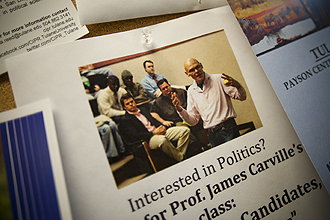Carville's class to analyze 2012 election
Once again, Tulane students will have the opportunity to discuss politics with James Carville and other national analysts and heavy hitters. Carville, a professor of practice in the political science department, is teaching a class in the spring semester that will focus on and dissect the upcoming presidential election.

“I really look forward to teaching this class,” says political consultant and professor of practice James Carville. “It's my favorite thing I do.” (Photo by Paula Burch-Celentano)
The class will take a look at the candidates, strategies and issues in the election. Unlike his previous classes, however, this spring's course will engage the electoral process as it is happening, something about which Carville says he's excited.
“I think it would be malpractice to have something like the election going on in real time and not take advantage of it in the class,” Carville says. “It looks like we're going to have a lot of things happening in real time, at least on the Republican end, which will make things interesting.”
As he has in previous classes, Carville will bring in colleagues from politics and media to delve into the issues. This year he says he wants to spend “a good deal of time” on press coverage of the election. His lineup of guests so far include TIME magazine and MSNBC political analyst Mark Halperin, election analyst Charlie Cook, New York Times executive editor Jill Abramson, and former U.S. Treasury secretary Roger Altman.
While the course affords students the opportunity to talk politics with knowledgeable and even famous guests, Carville maintains that most of his guests have indicated they have enjoyed the experience just as much as his students.
“Everybody wants to come back. They call me and ask to come back to this class,” Carville says. “They all say that our students are the best they've ever seen.”
Prior approval is required for enrollment in the course and Carville said the applicant pool for spring was the strongest he's seen in four years.
